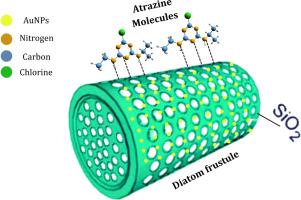Diatomite with gold nanoparticles for atrazine adsorption
IF 3.1
Q2 MATERIALS SCIENCE, MULTIDISCIPLINARY
引用次数: 0
Abstract
Atrazine is a commonly used herbicide worldwide, and it has significant environmental concerns due to its toxic ecological effects. This work uses diatomite decorated with gold nanoparticles to evaluate its capacity for atrazine adsorption. The structural characterization was studied by Fourier transform infrared spectroscopy (FTIR), Raman spectroscopy, Transmission Electron Microscopy (TEM), Scanning Electron Microscopy (SEM), Energy Dispersive spectroscopy (EDX), Fluorescence microscopy and X-ray photoelectron spectroscopy (XPS). Our findings reveal that diatomite decorated with gold nanoparticles with an average particle size of 10 nm enhances the Raman signal and fluorescence intensity for atrazine detection. Experimental conditions, such as atrazine concentration, pH, contact time, and diatomite mass, have been optimized to quantify the maximum removal conditions using ultraviolet–visible spectroscopy, reaching a maximum adsorption of 2.5 mg/g in 4 h. FTIR and XPS evidence the interaction of the amine groups of the atrazine with the diatomite-decorated surface. The impact of this work relies on environmental remediation using naturally available diatomite decorated with gold nanoparticles and understanding the binding interactions for the removal of atrazine.

用于吸附阿特拉津的含金纳米颗粒的硅藻土
阿特拉津是世界上常用的除草剂,因其有毒的生态效应而备受环境关注。本研究利用装饰有金纳米颗粒的硅藻土来评估其对阿特拉津的吸附能力。通过傅立叶变换红外光谱(FTIR)、拉曼光谱、透射电子显微镜(TEM)、扫描电子显微镜(SEM)、能量色散光谱(EDX)、荧光显微镜和 X 射线光电子能谱(XPS)对其结构特征进行了研究。我们的研究结果表明,用平均粒径为 10 纳米的金纳米粒子装饰硅藻土,可增强检测阿特拉津的拉曼信号和荧光强度。傅立叶变换红外光谱和 XPS 证明了阿特拉津的胺基团与硅藻土装饰表面的相互作用。这项工作的影响在于利用天然硅藻土装饰金纳米粒子进行环境修复,并了解去除阿特拉津的结合相互作用。
本文章由计算机程序翻译,如有差异,请以英文原文为准。
求助全文
约1分钟内获得全文
求助全文
来源期刊

Carbon Trends
Materials Science-Materials Science (miscellaneous)
CiteScore
4.60
自引率
0.00%
发文量
88
审稿时长
77 days
 求助内容:
求助内容: 应助结果提醒方式:
应助结果提醒方式:


